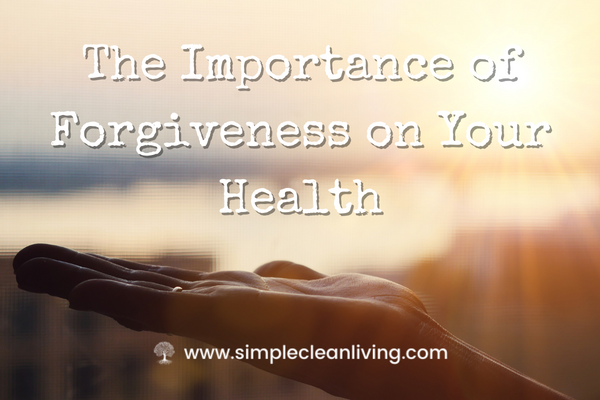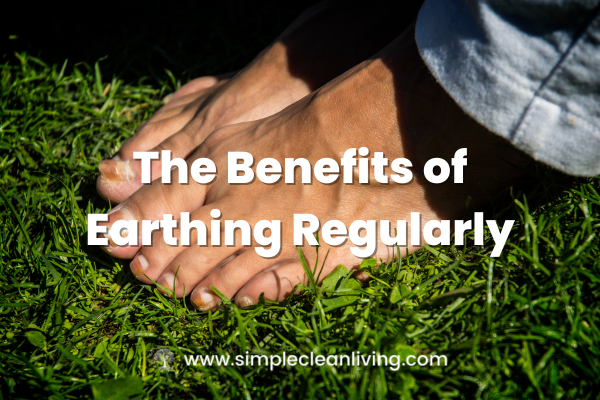Notice: I’m an affiliate for Amazon as well as other companies. Any links in this article may be affiliate links. I always appreciate it if you purchase something using my affiliate links. Doing so helps me to raise a little extra money that pays for the costs of running this site. And it allows me to continue bringing you quality content, all without costing you a thing! Thanks!
How often do your practice forgiveness? Did you know that it may be harming your health if you don’t?
As humans, we at some time will find ourselves in a situation where someone in our lives hurts us. It may be as simple as a loved one saying something that makes us feel bad. Or it may be as large as an act of betrayal that breaks our hearts and wounds us. No matter how someone has hurt us, we are called to forgive those who have caused us pain.
This is certainly not easy for most of us. Often, we would rather hold onto feelings of anger, hurt and resentment to protect ourselves from being hurt again. But holding on to negative feelings not only damages our spiritual health but damages physical and emotional health too.
Unforgiveness and stress
When we are unwilling to forgive others, we are making the choice to hold onto negative emotions. This creates physical stress throughout our bodies. After a while, this stress becomes chronic and can result in physical injury and disease. Stress is the number one contributor to the chronic illnesses that are so prevalent today. Whether that stress is emotional, mental, physical, environmental, or spiritual, it all contributes to disease. Unforgiveness is a form of mental and emotional stress.
Symptoms of stress
If you hold onto negative emotions for long periods, you will begin to experience health issues throughout the body. You may experience headaches, chronic pain, digestive problems, skin issues, sleep disturbances, heart-related problems (such as high blood pressure and palpitations), decreased immunity, and even obesity.
Emotionally, the lack of forgiveness begins to appear as anxiety, depression, irritability, resentment, lack of concentration, lack of organization, overwhelm, hopelessness, and worthlessness. It can appear as thoughts of suicide.
For the spiritual effects of chronic stress due to unforgiveness, we look to the eight fruits of the spirit from Galatians 5: 22-23. The fruits of the spirit are love, joy peace, patience, kindness, goodness, faithfulness, gentleness, and self-control. When we are wrapped up in a spirit of unforgiveness, it is nearly impossible to express most of these to the person who has wronged us. And we certainly do not feel a sense of peace about the situation.
Unfortunately, this can also carry through to other relationships in our lives as we allow the negative to be our focus. It seems natural for us to continue holding onto resentment and holding onto our grudge.
How you can begin to practice forgiveness
- Prayer! We are called to forgive others, but if you are struggling with letting go of resentment towards someone, ask a higher power to intervene. Prayer is the most powerful way to begin changing your heart, reducing the stress of unforgiveness, and leading you toward the path of peace. You do this by opening your heart to higher guidance.
- Gratitude. Practicing gratitude every day can redirect our focus away from the anger we feel for someone who has hurt us. It helps us to focus on the wonderful things that are going on in our life. If you have been wronged by a family member, spouse, child or close friend then begin to focus on things that you are grateful for about that person. It could be memories of times when they did something good for you. Or it could even be grateful for lessons that you have learned by going through a difficult time with your loved one.
- Meditation. Meditating is a powerful way to reduce stress, boost your immune system, and clear your mind of negative emotions. It can reduce the power of negative events in your life. Meditating for 15-20 minutes daily can stop your body from producing stress-related chemicals such as cortisol. It also lowers blood pressure, bringing more vital oxygen into your bloodstream. Meditating helps you to feel far more relaxed and positive.
When you forgive someone, you set yourself free. You become free from the stress of the negative emotions that you have held onto. This can help you to avoid stress-related illnesses and allow you to live with a greater sense of joy and peace. Making the choice to embrace forgiveness is the greatest act of love that you can give…to yourself.




